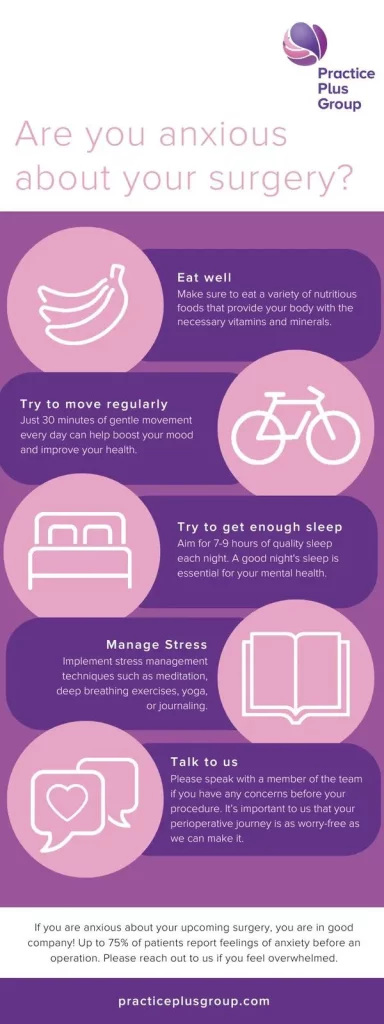Estimated reading time: 5 minutes
You’ve got your date for surgery and you’re in the process of preparing for the big day. While there are lots of physical and logistical things you can do, how do you manage pre-surgery anxiety? One of the most important things to bear in mind is that you’re not alone. Pre-surgery anxiety is very common and there are lots of resources to help you. In this article, we explore the steps you can take to help reduce anxiety before surgery, managing your fears and approaching your surgery with a calm and positive mindset.

What is pre-surgery anxiety?
Pre-surgery anxiety is a form of stress or fear experienced by some when we are about to undergo a surgical procedure. This anxiety can manifest in various ways, including:
- emotional
- psychological
- physical symptoms.
Understanding what pre-surgery anxiety is can help you address and manage these feelings.
There are different types of health anxiety. These include:
- Hypochondria: (now called illness anxiety disorder) defined as excessive worrying about health, to the extent that it has a negative impact on everyday life
- White Coat Syndrome: describes a patient experiencing high blood pressure and anxiety when physically in a clinical situation. It’s estimated that as many as 1 in 8 patients experience the symptoms of White Coat Syndrome.1
How common is pre-operative anxiety?
Pre-operative anxiety is probably more common than you think. So, if you’re feeling anxious, remember you’re not alone. Various studies and surveys indicate that a significant proportion of surgical patients experience anxiety to some degree. One global review showed that 48% of patients needing surgery experienced anxiety beforehand.2
Causes
Several factors contribute to pre-surgery anxiety. These include the following:
- fear of the unknown and a lack of understanding about the surgical procedure
- fear of pain and discomfort
- anxiety about the potential risks and complications during or after surgery
- fear of being put to sleep and the potential side effects of anaesthesia
- concerns about the surgery’s impact on work, family, and daily activities
- past experiences with surgery or medical procedures that were unpleasant or traumatic.
Pre-surgery anxiety symptoms
The symptoms of pre-surgery anxiety typically show up in the following ways:
- Emotional symptoms: this involves having negative feelings of fear, nervousness, or apprehension. Some people may experience mood swings or irritability
- Cognitive symptoms: patients may experience difficulty concentrating, racing thoughts, or preoccupation with their upcoming surgery
- Physical symptoms: increased heart rate, sweating, trembling, shortness of breath, nausea, or sleep disturbances.
The benefits of better well-being before an operation
Whether you experience pre-surgery anxiety or not, it’s important to look after yourself and relax before your procedure. Improved well-being can result in a faster, smoother recovery.
Supporting your wellbeing before your operation can result in:
- lower anxiety levels can lead to more stable blood pressure and heart rate, lowering the risk of complications
- reduced stress and anxiety can enhance immune function, which is crucial for healing and preventing infections
- lower stress levels can lead to reduced inflammation, promoting faster tissue repair and recovery
- patients with lower anxiety levels often report less postoperative pain, which can enhance comfort and speed up recovery
- reduced anxiety can lead to quicker mobilisation, leading to a faster return to normal activities
- managing anxiety before surgery can prevent post-operative psychological issues such as depression or post-traumatic stress disorder (PTSD).
How do you relieve anxiety before surgery?
From positive reviews to sticking to the facts, here are a handful of ways to relieve anxiety before surgery.
Get the facts
One of the most effective ways to alleviate anxiety is to understand what the procedure entails. Before your pre-surgery appointment, write down any questions or concerns you have. Bringing a list ensures that you don’t forget anything during the consultation and helps you feel more in control of the situation.
Below are some questions you might want to ask:
- what exactly will happen during the surgery?
- how long will the procedure take?
- what is the recovery process like?
- what are the potential risks and complications?
Having detailed information can demystify the process and reduce the fear of the unknown.
Find a surgeon you can trust
Look for a surgeon with a good track record of successfully completing the operation you are due for. Have a thorough discussion with them about any concerns or questions you may have regarding the surgery and its safety.
Read positive reviews
Reach out to others who have undergone the same surgery. Their experiences and positive outcomes can provide reassurance and help alleviate anxiety.
Patient testimonial
“My knee pain was affecting every aspect of my life when a friend recommended Practice Plus Group…everyone from the tea lady up made me feel at home at the hospital.”
Emma Beadman, knee replacement patient at Practice Plus Group Hospital, Plymouth
Follow pre-surgery instructions
Your medical team will provide specific instructions to follow before surgery. These can include:
- fasting guidelines
- medication adjustments
- hygiene practices.
Adhering to these instructions not only ensures your safety but also gives you a sense of control over the situation.
Make a recovery plan
Preparing your home for post-surgery recovery can ease anxiety about the days following the procedure. Make sure you have:
- a comfortable place to rest
- essential items within easy reach
- support from family and friends.
Having a well-organised recovery space can make the post-surgery period less daunting and more manageable.
Stop smoking
If you smoke, you should strongly consider quitting or reducing your smoking before surgery. Smoking can increase anxiety, increase the risk of complications during surgery, and complicate the healing process. Seek support from your healthcare provider or a programme to help you quit.
Prepare your body
If your doctor approves, maintaining a light exercise routine can help reduce stress and improve your overall mood and well-being. Activities like walking, yoga, or gentle stretching can be particularly beneficial.
Both caffeine and alcohol can increase anxiety levels and interfere with sleep. Try to reduce or eliminate these in the days leading up to your surgery to help keep your anxiety in check.
Eating a balanced diet can have a positive impact on your mood and energy levels. Ensure you’re getting plenty of fruits, vegetables, lean proteins, and whole grains. Staying hydrated is also crucial, so drink plenty of water.
Seek professional support
If your anxiety feels overwhelming and unmanageable, it might be beneficial to seek professional help. Cognitive-behavioural therapy (CBT) and other forms of counselling can provide you with effective strategies to manage your anxiety.
Complementary therapies
Consider incorporating complementary therapies into your pre-surgery routine. Therapies such as acupuncture, massage, aromatherapy, and hypnotherapy can help reduce anxiety and promote relaxation. Always consult with your healthcare provider before starting any new therapy to ensure it’s safe and appropriate for you.
Pre-surgery anxiety drugs
For some people, anti-anxiety medication may be necessary to manage severe anxiety. If you’re struggling to cope, talk to your healthcare provider about your symptoms. They may prescribe medication to help you stay calm before and during your surgery. Be sure to follow their instructions and discuss any concerns or side effects you may experience.

How to prepare your mind for surgery
Being physically fit for surgery is only one part of the preparation. Mental preparation is equally important. Facing surgery can evoke various emotions, from anxiety to outright fear. However, taking steps to prepare your mind can help you approach the procedure with a calm and positive mindset.
Here are some strategies to mentally prepare for surgery at each stage of your journey.
The weeks and months before surgery
In the weeks and months before your surgery, try to practise day-to-day habits that improve well-being and promote a sense of calm. From getting regular sleep and fresh air to a healthy diet – these wellness practices can help to soothe fears and make you feel healthy and strong.
Understand your feelings
Acknowledging and understanding your feelings is an essential first step in managing anxiety. It’s normal to feel scared or anxious before surgery, and it’s important to give yourself permission to experience these emotions. Talk openly with your loved ones, a therapist, or a support group about how you’re feeling. Understanding that your emotions are valid and natural can help you approach your surgery with greater acceptance and calmness.
Visualise the benefits
Visualisation is a powerful tool for reducing anxiety. Spend a few minutes each day imagining yourself successfully undergoing the surgery and recovering quickly. Picture yourself feeling strong, healthy, and happy. This positive imagery can help create a more optimistic mindset.
Write down your thoughts
Keeping a journal can be a therapeutic way to process your feelings and reduce anxiety. Writing down your thoughts, fears, and questions can help you organise your mind and gain a clearer perspective. Reflecting on your entries can also help you track your progress and identify any recurring concerns to discuss with your healthcare provider.
Talk to friends and family
Sharing your concerns with someone you trust can provide emotional support and alleviate anxiety. This could be a family member, friend, or a professional counsellor. Sometimes, just voicing your fears can make them feel less overwhelming.
Join a support group
Connecting with others who are going through similar experiences can be incredibly comforting. Support groups, whether in-person or online, provide a space to share your concerns, gain insights, and receive emotional support from those who understand what you’re going through. Your healthcare provider may be able to recommend a support group for surgical patients.
The night before surgery
The night before your operation, make sure you have a bag packed and ready to go. It can also be nice to plan a little treat for when you return home, like a nice dinner or relaxing activity.
Relaxation techniques
Incorporating relaxation techniques into your daily routine can help calm your mind and body. Some effective methods include:
- Deep breathing exercises: and breathe…! Practising these regularly can help lower stress levels. Try inhaling slowly through your nose, holding the breath for a few seconds, and then exhaling slowly through your mouth
- Mindfulness meditation: this can help you stay present and reduce anxiety. Apps like Headspace or Calm offer guided meditations that can be particularly helpful
- Progressive muscle relaxation: involves tensing and then slowly relaxing different muscle groups in your body, which can help release physical tension
Keep busy
Sometimes, the anticipation can be worse than the surgery itself. Plan activities that you enjoy and that can keep your mind occupied in the days and hours leading up to the procedure. Watch a movie, read a book, listen to music – anything that might help you disengage and destress.
The day of your surgery
Relieving anxiety on the day of your surgery is crucial for maintaining a calm and positive mindset. Practise deep breathing, listen to relaxing music, and talk to the healthcare team to keep your mind at ease.
How we can help you to stop worrying before surgery
We’ve looked at the general recommendations around managing anxiety before surgery. Now it’s time to explore what Practice Plus Group does to help our patients. First, some stats to help reassure:
- our experienced surgeons carry out around 5,000 treatments every month
- we’re recommended by 99% of patients
- we have excellent CQC ratings
- we enjoy a track record of completing successful surgeries.
If you’re having your surgery with us and feel anxious about the procedure, there are several measures we can take to make you feel more comfortable. These include:
- a tour of the hospital led by a member of staff to help familiarise with the layout
- arranging a meeting between you and the doctors and nurses who will treat you so you are familiar with the team before treatment begins
- if you experience a rise in blood pressure during an appointment, a member of the nursing team can take you to a quiet room and check your blood pressure again
- we can move you into a quieter environment or arrange for surgery to be performed at a later time.
Helpful relaxation resources
We’ve provided a list below of resources to help you stay calm and balanced before your procedure:
- NHS every mind matters
- Relaxation recording from the Royal College of Anaesthetists
- Relaxation activities from Mind
- Overcoming cataract surgery anxiety
Remember that feeling anxious before surgery is a natural response. With the right preparation and mindset, you can significantly reduce your anxiety levels. Your medical team is here to support you every step of the way, so don’t hesitate to reach out with any concerns or questions.
Sources and references
1 White coat hypertension: improving the patient-healthcare practitioner relationship
2 Prevalence and factors associated with pre-operative anxiety among surgery patients

Acknowledgements
FAQs about psychological preparation for surgery
Not yet found the information you’re looking for? Our surgery preparations FAQs can help!
Yes, you can take anxiety medication before surgery. However, this should only be under the guidance of your healthcare provider. They will prescribe and manage the appropriate medication to ensure it is safe and effective for your specific situation.
Absolutely. Our anaesthesiologists are experts in managing patients with anxiety and will take the necessary steps to ensure your comfort and safety throughout the procedure.
Anaesthesiologists may administer medications such as benzodiazepines (e.g. midazolam or lorazepam) to help reduce anxiety before and during surgery. These medications help you relax and remain calm.
The pill often prescribed to calm down before surgery is a benzodiazepine. Typically, this comes in the form of midazolam (Versed) or lorazepam (Ativan). Your healthcare provider will determine the best option for you.
If you’re supporting a friend or relative as they prepare for surgery and they are feeling nervous, try the following:
– offer emotional support by listening and reassuring them
– encourage them to ask questions and get detailed information from their medical team
– practice relaxation techniques together, such as deep breathing or meditation
– distract them with activities they enjoy
– remind them of the positive outcomes and benefits of the surgery.






